12 min read 🤓
Pure . Reactive . Music . Hack Day
july 18, 2009.
Over the weekend of july 11/12th a swarm of 'digital music hackers', brought
together on the occasion of the London
Music Hack Day, occupied the first floor of the brand new offices of
the Guardian,
just around the corner from King's Cross tube- and railway station, for
a full 32 hours in-one-stretch.
For that is the idea of a Hack Day: gather a bunch of creative and energetic enthusiasts
at some suitable place, provide them with free food,
coffee, red bulls and beers, give them the tools they might need, lock them
in for 24 hours, and then marvel at the brilliant things they come up with.
Sort of a brainstorm, indeed, and increasingly popular especially -
but not only - in the world of hi-tech and web-companies.
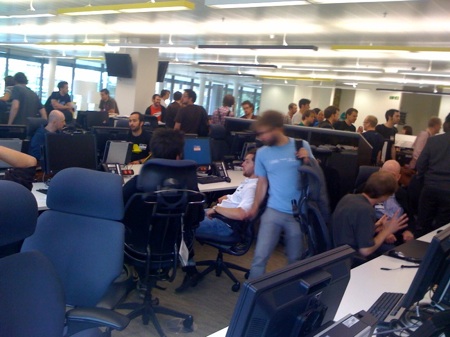
Envisioned and organized by James Darling and Soundcloud's Dave Haynes, London Music Hack Day, besides hosting workshops by RjDj, latter-day prophets of deferred form and inter/re/active music (... "huh!?" ... read on! ...), and the physical computing and interaction designers of Tinker.it, involved companies that make the streaming, selling and/or up-/downloading of digital music files their business (other than Soundcloud, there were 7digital, LastFM and peoplesmusicstore) and some that are focusing rather on the meta-side of music and its industries, like BBC Music, Gigulate. Or Songkick, striving - with the aid of concertgoers, who are asked to create their personal gigographies - to compile as complete as possible a database of this world's past and present live music events; and I suspect that were there other live music to be discovered in some distant galaxies, it'll eventually be included.
Songkick's basically an interesting project, as it might eventually assemble a unique collection of
remembrances and memorabilia. If attendees of events indeed can be persuaded to massively upload their tickets and pictures,
maybe sounds and vids, and
write about
their personal experience of the events, the little things that happened, who was there with them, etcetera. But for this to happen and become accessible
there is a long way still to go. Just for fun, I tried to compile a short list of some of the concerts that I
attended in the past, but the user interface that should allow one to do so is pretty awful, as is the current interface
to the full gig directory, and I gave up after a couple of minutes.
It evidently is a highly complex problem to put together such an historical index,
and have some sort of ongoing check on the correctness of the data gathered, and I wonder whether Songkick's
current approach is a viable one. It probably does a better job checking and tracking current and upcoming
concerts, though, which seems to be what most people are using it for, as Songkick provides a location-based
service for this.
It of course does come with loads of data, and combining
data from varying sources into something that might turn out to be more
than the sum of its parts was at the heart of what much of the Music Hack
Day was about.
It was certainly no coincidence that it was the Guardian that so generously hosted this Hack Day event on its premises. This mayor UK daily's open platform and its Data blog, in which for free, public use are brought together all of the facts and figures that underlie its news coverage, were a seamless fit. It also underlines a growing awareness worldwide that, in the words of the paper's editor-in-chief Alan Rushbridger, "facts are sacred, and they belong to all of us".
Indeed, "the world is the totality of facts, not of things,", and though my recent ongoing citing of Wittgenstein maxims obviously and consciously borders on the tongue-in-cheek, there is no denying that there is no controlling your world without controlling - or at least being fully aware of - the manifold networks of its data.
Among the many 'music data mining and exploitation' possibilities presented I was most impressed by the potential of the music analysis and remix tools created and provided by the Echonest, which I would have loved to try my hands at, given the time that there was not. A description of Ben Smith's "BotTalk" hack might give you the idea, as well as an impression of what all that 'hacking' was about. Ben combined API's provided by LastFM and the Echonest to generate a mashup remix of tracks from a LastFM user's list of 'top artists'. The tracks, Ben explains on his code-page, were "sorted according to pitch and each track has a drum track created by taking the bars from the next track that match the key of the current track. Each track is then mixed with it's beat track, with the beat track looped; the resulting mix tracks are ordered by loudness and 30ish seconds of each are bolted together to create the final mix-tape".
...
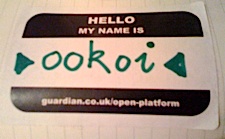 If
you have followed the ookoi's
doings over the past couple of years, you might suspect why these things
fascinate us, and why - though being a mere goal-directed programmer, and
a bender more than a hacker - I crossed the Channel
to hang out at the London Guardian offices last weekend. Over the years
data have
become increasingly important in ookoi's work, as has the understanding
that indeed the essence of our work does not lie within the creation of
a series of fixed recordings (one
after
the
other
after
the
other
after
the ... ), but rather in the generation of a steadily evolving collection
of sonic ingredients that may be combined, taken apart and re-combined in
'works/things' of which traditional recordings will provide merely snap-shots. Basically,
they are 'continuously evolving'. Without proper
beginning, nor actual end.
If
you have followed the ookoi's
doings over the past couple of years, you might suspect why these things
fascinate us, and why - though being a mere goal-directed programmer, and
a bender more than a hacker - I crossed the Channel
to hang out at the London Guardian offices last weekend. Over the years
data have
become increasingly important in ookoi's work, as has the understanding
that indeed the essence of our work does not lie within the creation of
a series of fixed recordings (one
after
the
other
after
the
other
after
the ... ), but rather in the generation of a steadily evolving collection
of sonic ingredients that may be combined, taken apart and re-combined in
'works/things' of which traditional recordings will provide merely snap-shots. Basically,
they are 'continuously evolving'. Without proper
beginning, nor actual end.
It is for this and related new and different notions of 'work' that recent evolving technologies (web application, video games, mobile devices ...) provide a 'natural' platform ( * ). Which in turn is the reason why for quite some time now already we have been researching the possibility of applying ookoi's work-philosophy to the (already no longer so very) new mobile devices, and e.g. develop some ookoi iPhone things.
...
 RjDj
is certainly among the most interesting of the currently available 'iPhone music things'. If you are somewhat familiar
with dsp, you will grasp what I mean when
I say that at heart the RjDj app, via a library of 'abstractions', provides you with the
necessary ins and outs
to execute PD-patches on your iPhone, and access some
of the iThing's typical features,
like, most prominently, the microphone and the accelerometer.
RjDj
is certainly among the most interesting of the currently available 'iPhone music things'. If you are somewhat familiar
with dsp, you will grasp what I mean when
I say that at heart the RjDj app, via a library of 'abstractions', provides you with the
necessary ins and outs
to execute PD-patches on your iPhone, and access some
of the iThing's typical features,
like, most prominently, the microphone and the accelerometer.
A such patch RjDj calls a scene. The application is nothing more (nor less) than a player for the scenes. The
scenes are the 'songs'. And if you know how to make a PD-patch, you know how
to hack an RjDj-scene.
So, that what
you are 'playing' in general will not be finished sound/music recordings,
but - more or less open and inter/re/active - sound/music generating processes ...
I remember
a footnote in Paul Hegarty's (somewhat tedious) history of noise/music book
( ** ) that - and I think he is right -
denounces laptop music performances as being "not enough of an anti-spectacle".
One should, he writes, "remove the laptop performer altogether". Putting it with just a bit of
hyperbole, RjDj allows you to do exactly that: get rid
of the laptop performer by downloading h(er)(is) patch as a scene, to listen to and play around with.
That is one of RjDj's potentials. Maybe it is just a minor one.
The second is the one put to the fore by RjDj's creators. It is a fine buzzphrase as well: reactive music.
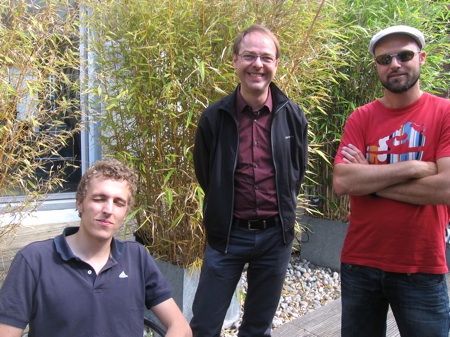 |
RjDj-makers (fltr) Florian Waldner, Frank Barknecht and RjDj-founder Michael Breidenbruecker, tuesday july 14th, atop of their brand new London office, just off Clerkenwell Road, where we took some air and sun. |
I only enjoy walking around with earplugs listening to sounds on a walkman or pod-like device for an extended period of time when actually, in one way or another, the real-world soundscape around me continues to be involved. This for instance is the case when one monitors incoming sounds on a recording device while field recording the city or elsewhere, simply because listening through headphones comes with a rather drastic transformation of the sonic picture that one is receiving: it's a different world that you listen to in stereo; some say it's even better in mono ... ;-) . It is also something that I found to occur when a couple of years ago I went around Paris with my ears plugged to the quietish ambient loops of FM3's Buddha Machine, which added an interesting 'inside' layer to the sounds from the 'outside'. This experience I recalled some time after, in december 2006, when reporting on Noah Vawter's Ambient Addition project. Noah constructed a walkman-like device, which had binaural microphones built into a set of headphones, and used a dsp chip to analyze the environmental sounds and, applying a certain number of algorithms and transformations, musicalize them.
While at the time Noah had to custom built his 'reactive walkman', RjDj includes such principles of 'ambient addition' (or, as I'd rather call it: 'ambient transformation') in the reactive music that it proposes to bring to your mobile devices by means of its scenes. Many of these - like the app's primordial Echolon scene - use the microphone and in real time apply a certain number of effects to the environmental sounds thus taken in. (For those that are wondering, the 'R' stands for 'Reality'.)
Of course it has been possible for a long time already for artists
to present and distribute their works as an inter/re/active application.
But until recently almost always this implied the cumbersome process of
launching a standalone application from a CDrom or DVD, or some webapp at
a dedicated URL, which appears in the end to be a huge no no for
other than merely incidental use. ( *** )
Besides its mobility, the fact that a platform like RjDj's
for the playing of interactive sound/music scenes asks for manipulations
that are not different from those necessary for launching a track or playlist in an mp3 player,
makes all the difference.
I remember a discussion on interactivity in relation to music which
lead me to conclude that, all said and
done, 'interactive music' is just a fancy way of saying: 'instrument'.
RjDj reflects this fact, by having all of its
scenes come with the option to record all that one is listening to.
Absolutely
right.
It also follows that each listener will get the music she or he deserves:
though it remains possible to passively listen also to
such modular inter/re/active music, the listener is encouraged to
participate in the creation of the auditive experience other than 'merely'
by giving it his or her attention. That participation and the corresponding
acquisition of a certain skill (practice) in playing a scene, like in playing
a game, does prove to be rewarding.
One need not be a visionary to predict that mobile applications will become
a major channel for the distribution of music (and of content in
general). Such applications will allow musicians to present and give access
to their music in ways that go far beyond the mere set of fixed sound recordings
on a CDs or as a collection of downloadable digital files. 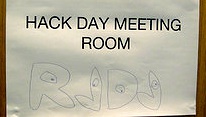
For some time already
with the ookoi we have been researching the possibility
of presenting our soundtrack
for Winterland as an interactive iPhone application. We indeed went
through the somewhat cumbersome procedure of officially enrolling as 'iPhone
developers' with Apple, played around with the DK,
learned a bit of Objective-C, read manuals and tutorials and met up for drinks with
pro-programmers ("Hi Daniel!" ;-) ...).
Also our interest in RjDj's approach stems from
this initial motivation. Which, actually, on the way, broadened up, and
meanwhile has given rise to a whole series of ideas and what we'd like to-do's.
RjDj now, after many years, finally provided us with a valid excuse to learn PD and begin to compose PD patches.
It was with some of the ookoi's first home-brewed PD-patches, a lot of questions but also more or less clear ideas on what iPhone inter/re/activity we wanted to add to them, that I came to RjDj's workshop at the Music Hack Day.
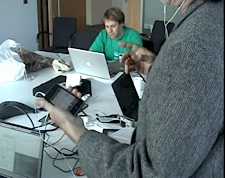 |
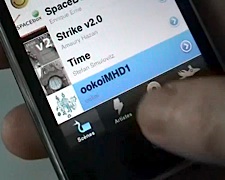 |
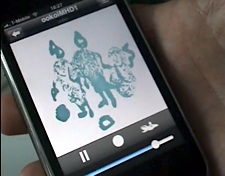 |
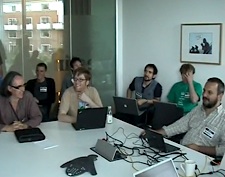 |
ookoi doing RjDj at Music Hack Day, London, july 11/12, 2009. (Pictures are stills taken from a uTube shot by Florian Waldner.) | |
I am happy to say that I went to the right place. It was fun. It was instructive.
It was productive.
With the help of Florian Waldner and Frank Barknecht, early sunday afternoon
a test-version
of ookoi's ShakeNRoll was up and running
on my iPhone.
...
Pure image.
Pure sound.
Pure data.
That makes sense.
...
[ More to come _ ![]() follow @ookoi
]
follow @ookoi
]
____Music Hack Day links:
|| two
days when music was hacked (rjdj composers blog)
|| Music
Hackday report (Tinker it now!)
|| my
hack: TwinkleStarduino (Rain Ashford, I
love Kittens ...)
|| Little
vid from Music Hackday
|| Guardian
Music Blog
|| Music Hackday 2009 (Nixon McInnes, social media goodness)
|| Music
Hackday Goodies (Peter Kim, create digital music)
|| the Beer Bottle Percussion Machine (Peter Kim, create digital music)
notes __ ::
(*) Formerly a composer might have fantasized about creating an audiowork that will
be played continuously,
24/7, and evolve over time; it is through the technology of e.g. audio streaming servers that this becomes a
'natural' format, no less available for use than that of a CD recording or an hour-long concert performance.
[ ^
]
(**) Footnote 25 on page 150 of
Paul Hegarty - Noise/Music: A History.
(Continuum - New York/London, 2008)
[ ^
]
(***) I count myself surely
among the highly interested users, and have quite a collection of these CDroms. But I doubt there
is more than a handful among these that I started up more than once. And when I did, that probably
was merely twice or thrice. [ ^ ]
tags: ookoi, London, RjDj, iPhone, Hack Day
# .319.
Read about the ookoi elsewhere:
ANNUAL, 1, december 2023 (Korm Plastics) - Green-tainted hyperbole, quailish quirks and summer-flies. The inscrutable genius of the ookoi.
eContact! 21.2, july 2023 - Towards an Unhearable Music. Conceptualism in the ookoi's art.
Gonzo #88, september/october 2008 - Zelfcomponerende Klankstukken
Read about the ookoi and Raudio and Stduio on the SoundBlog:
(2024, december 24) - The « ookoide » (Awesome Foursomes (xxii) - No. 131)
(2024, september 10) - Home is my Rome (Awesome Foursomes (xix, xxi) - No. 506, 507)
(2024, june 17) - Long live ookoi! (Leve ookoi!): a b.ookoipera / een tehoorspel
(2024, march 04+) - The « ot-o ki do ki » (Awesome Foursomes (xviii) - No. 624)
(2023, december 31) - d.ookoi writes b.ookoi (ii) - A Year in the Rear (2023)
(2023, december 16+) - Awesome Foursomes (xi) - No. 178
(2023, december 16+) - Awesome Foursomes (x) - No. 789
(2023, december 16+) - Awesome Foursomes (ix) - No. 329
(2023, august 20) - Three days of residency at Les Ateliers Claus, Brussels
(2022, april 25) - Awesome Foursomes (viii) - No. 664
(2022, march 31) - Awesome Foursomes (vii) - No. 138
(2022, february 20) - Awesome Foursomes (vi) - No. 419
(2021, november 01) - Awesome Foursomes (v) - No. 954
(2021, august 20) - Awesome Foursomes (iv) - No. 793
(2021, july 18) - Awesome Foursomes (iii) - No. 562
(2021, july 09) - Awesome Foursomes (ii)- No. 284
(2021, june 21) - Awesome Foursomes (i) - No. 019
(2021, may 31) - d.ookoi writes b.ookoi (i)
(2020, january 26) - STDUIO Arti: aLife @Hal-fIve
(2020, january 25) - STDUIO Arti: The LⒶst Weekend
(2019, march 03) - ookoi 2.0: the remake of a spect[r]al b[r]and
(2017, april 12) - 1024
(2015, march 07) - The men once in green are now writing a book!
(2014, may 09) - You are NOT Hier!
(2013, july 03) - How to keep devils away
(2013, may 06) - Next Numbr!
(2012, june 24) - Ninja Fruit Plus Instruments
(2012, may 06) - Y.3 = Yltra !
(2012, may 06) - Our final gig / Ons laatste optreden
(2010, may 23) - 'Raise the trumpet, sound the drum'
(2010, april 02) - [Second Life and WudyWudy]
(2010, january 05) - ookoi: onderood
(2009, november 17) - Soli Deo Gloria !
(2009, october 10) - Project Icarus OST
(2009, august 24) - ookoi ShakeNRoll
(2009, july 18) - Pure . Reactive . Music . Hack Day
(2009, april 07) - "Blood and Bottom" (Raudi0GaGa)
(2009, february 21) - Insular arithmetic (ookoi toont)
(2009, january 31) - A glimpse of Heesbeen
(2009, january 15) - Rien à voir
(2008, october 02) - The right to be slow
(2008, june 06) - Raudio Graffiti: almost live !
(2008, february 24) - The Great Washing
(2007, december 04) - I'm an island
(2007, november 20) - Live Beyond the Paradiso, Amsterdam
(2007, september 04) - leve ookoi! (3)
(2007, august 22) - leve ookoi! (2)
(2007, august 12) - leve ookoi! (1)
(2007, april 12) - Back to Berlin [Raudio 11/15]
(2007, march 24) - Vicky, Killers and Avatars
(2007, february 15) - Every presentation is a premiere
(2007, january 25) - 1024 Waarden, by ookoi
(2007, january 19) - Preparations for a Second Life
(2006, november 05) - Cellarlar Heroes
(2006, october 20) - Funky shit
(2006, august 14) - placard : la générale
(2006, july 07) - de-'tails of lite house keeping'
(2006, may 06) - jam karet?
(2006, april 04) - 100+ new (r)audio philes ... [3] [Raudio 07]
(2006, march 20) - raudio @cosman's
(2006, march 12) - 100+ new (r)audio philes ... [2] [Raudio 07]
(2006, march 03) - 100+ new (r)audio philes ... [1] [Raudio 07]
(2005, october 12) - Raudio #06 [Raudio 06]
(2005, september 25) - 0 OK, 0:1, life on ze road
(2005, july 31) - Outside - Inside Paradiso
(2005, june 18) - Sand-Y da-Y #5-7 [Raudio 05]
(2005, june 05) - Sand-Y :: da-Y #04 - da birds
(2005, may 26-24) - Sand-Y :: da-Y #03, #02, #01 - Crew cut ; "The truth is out here" ; ::
(2005, may 14) - 9 Beet Stretch [Raudio Special]
(2005, march 31) - Raudio #04 :: "GespRek 1982-2005" [Raudio 04]
(2005, february 10) - raudio #3 (drie/three) [Raudio 03]
(2004, december 08) - pure sound [Raudio 02]
(2004, november 24) - other, and good news! [Raudio 01]
(2004, october 10) - raudio launched
(2004, september 24) - made in ameland
(2004, june 09) - boyzz buzz # listen!global corpus
(2004, may 20-31) - >∞-îl_o_tré
Read some of the ookoi's papers in pdf:
(2014) - Localized Sounds, Sounding Locations.
Presented at the International Symposium "Locative Media and Sound Art", Kortrijk (be)
(2007) - ookoi - Uptime Publishing Demonstration. (With Jay Needham.)
ookoi - The works:
(2015—now) :: writing b.ookoi: pick a number!
(2017) Weekly, 10'24" :: ookoi dooki podcast
(2014) HIER - iPhone app, 4 track album of localized Future Popp
(2013) Y ¬ Y.1024 (HTML5 web app)
(2013) Wandelzand - iPhone app, soundwalk for the Dutch isle of Ameland
(2012) Palm Top Theatre V2
(2010) WudyWudy, machina movie, filmed in Second Life by Evo Szuyuan (trailer)
(2009) ookoi_@_E@rport, Amsterdam - channel 19 of the RAUDIO IIIII streaming audio art iThing app
(2009) ShakeNRoll, Project Icarus OST - scenes for the RJDJ reactive music iPhone platform
(2009) iRingg®, iPhone ringtones
(2009) 2525 (video)
(2008) L'Ecoute - public space screen video
(2008) Jam Karet I & Jam Karet IV - pocket movies
(2007) Live beyond the Paradiso (USB-stick data-dump)
(2007) Leve ookoi! - channel 16 of the RAUDIO IIIII streaming audio art iThing app
(2007) 1024 (DVD)
(2007) 1024 Waarden - flash animation
(2006) "Roam Stroam" - channel 12 of the RAUDIO IIIII streaming audio art iThing app
(2006) Tijdrekken - flash animation
(2005) Sand-Y (Zandoog) - channel 7 of the RAUDIO IIIII streaming audio art iThing app
(2004) Muziektafel-Tafelmuziek (CD)
...
(1980) Signs and Symptoms
comments for Pure . Reactive . Music . Hack Day ::
|
Comments are disabled |